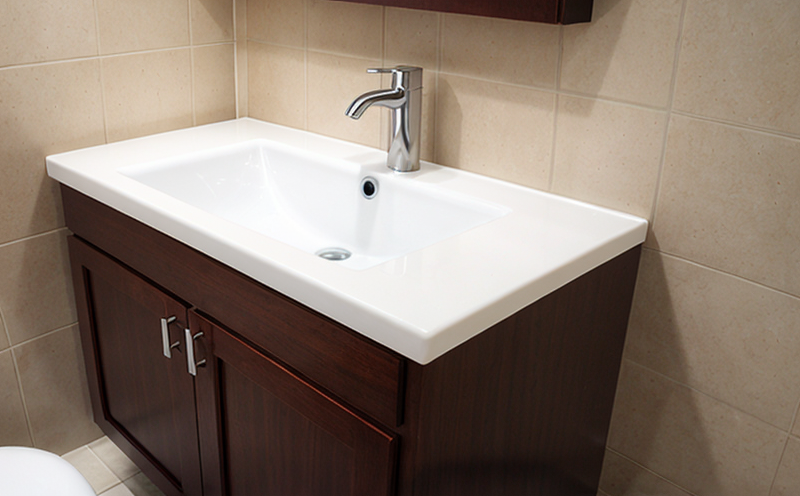JIS K 7191 Flexural Testing of Sanitary Plastic Materials
The JIS K 7191 standard specifies methods for determining the flexural properties of sanitary plastic materials. Flexural testing is crucial in evaluating the mechanical strength and durability of these materials, ensuring they meet the rigorous demands placed on them in bathroom and sanitation applications.
This test measures how much a specimen bends under load before breaking or permanently deforming. The method provides valuable insights into the material's resilience to stress and strain, which are critical factors for products like shower doors, toilet seats, and bathtub enclosures. Flexural strength is an essential parameter for ensuring that sanitary plastics can withstand everyday use without compromising safety.
The process involves placing a sample under load until it breaks or permanently deforms beyond specified limits. The load is applied at a specific rate, typically at three points along the specimen's length. This setup simulates real-world loading conditions, making JIS K 7191 an invaluable tool for product development and quality assurance.
For accurate testing, samples must be prepared in accordance with JIS K 7191 requirements. Specimens are typically cut from larger sheets of plastic using precise methods to ensure uniformity. The specimens should have a defined cross-sectional shape and dimensions as specified by the standard. Proper sample preparation is critical for obtaining reliable test results.
The testing apparatus used in this procedure includes a flexural testing machine capable of applying controlled loads at a constant rate. The machine must be calibrated according to ISO standards to ensure accurate measurements. Special fixtures are often required to hold the specimens securely during testing, ensuring consistent load application and preventing specimen movement.
After the test is conducted, the results provide detailed information on the flexural modulus (stiffness), flexural strength (maximum stress before failure), and flexural strain (amount of bending). These parameters are crucial for understanding how the material behaves under different loading conditions. The data obtained from these tests can be used to optimize product design, improve material selection, and enhance overall quality.
Flexural testing is particularly important in the bathroom and sanitation sector where materials must endure high stress due to frequent use and exposure to moisture. By adhering to JIS K 7191 standards, manufacturers can ensure their products meet stringent quality requirements, enhancing customer satisfaction and trust.
The results of flexural tests are typically reported according to the standard format specified in JIS K 7191. This includes tabulated data for each specimen tested, along with graphical representations of load-deflection curves. The report should also include any relevant observations or notes from the test procedure.
Flexural testing is just one aspect of comprehensive material evaluation. In conjunction with other tests such as impact resistance and creep resistance, flexural testing provides a holistic view of the mechanical properties of sanitary plastic materials. This information is invaluable for ensuring product reliability and safety in demanding environments.
Benefits
The JIS K 7191 flexural test offers several key benefits to manufacturers, quality managers, and compliance officers:
- Ensures that sanitary plastic materials meet strict mechanical property requirements.
- Improves product reliability and safety by identifying weaknesses in the design or material selection.
- Simplifies regulatory compliance by adhering to international standards.
- Aids in optimizing production processes through detailed test data analysis.
- Enhances customer satisfaction by delivering high-quality products that meet expectations.
- Supports research and development efforts by providing accurate baseline data for new materials.
Why Choose This Test
Selecting the JIS K 7191 flexural test is essential for several reasons:
- The standard provides a precise and reliable method for assessing the mechanical properties of sanitary plastic materials.
- It offers clear guidelines on sample preparation, testing procedures, and data interpretation, ensuring consistent results across different laboratories.
- JIS K 7191 is widely recognized and accepted in the industry, enhancing credibility and trustworthiness.
- The test can be tailored to specific product requirements, allowing for customized evaluations that meet unique needs.
- Compliance with this standard helps manufacturers stay ahead of regulatory changes and market demands.
- The results are highly reproducible, making it easier to track quality improvements over time.
Customer Impact and Satisfaction
Implementing the JIS K 7191 flexural test has a direct positive impact on customers:
- Customers receive products that are more durable and reliable, reducing the likelihood of defects or failures.
- The high-quality materials used in these products enhance customer satisfaction by providing consistent performance over time.
- Compliance with this standard demonstrates a commitment to quality, which builds long-term customer trust and loyalty.
- Customers can expect products that meet international standards, ensuring they are safe and effective for use.
- The test results contribute to the development of innovative products that meet evolving market needs.





